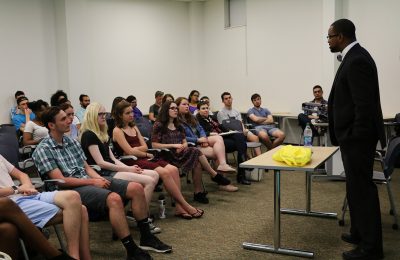
Approximately 40 people attended a conversation on racial justice held by Northeastern University College Democrats on Northeastern University’s campus Tuesday night.
The conversation featured speaker Rahsaan Hall, director of the racial justice program for the American Civil Liberties Union of Massachusetts.
Amanda Knightly, the communications director for Northeastern College Democrats and a junior at Northeastern, told The Daily Free Press that the talk was organized to start a dialogue about the aggression that arose during the last election cycle.
“I really just want attendees to come and be able to have a conversation … even if it’s uncomfortable at times,” Knightly said. “I think that’s the kind of thing that needs to be done … to have these uncomfortable conversations and kind of come to terms with the issues that are on our campus.”
Hall began his talk by thanking the Northeastern School of Law for providing a space for the talk. Hall graduated from the Northeastern School of Law in 1998, and attested to the positive impact of his experiences there.
Hall said his passion for racial justice was in part inspired by Johnnie Cochran, a lawyer on the O.J. Simpson case who Hall followed in the media while he was in college.
“I tied that experience of seeing him in the courtroom with this deeper tie to the notion of justice,” Hall said. “One of the things that the trial revealed is this great divide in America. Overwhelmingly, black folks thought that O.J. either didn’t do it or they thought that he got away with it and we were cool with it because for so long, black folks in this country had been on the receiving end of injustice.”
As a black man, Hall said he often questioned whether being a prosecutor put him on the right side of the law.
“I expressed this reservation about being a black man in the position to send other black folks to jail,” Hall said. “[My boss] said, ‘I appreciate that, understand that, but the people who are victims of these crimes, the communities that are impacted by these crimes, deserve representation as well.’”
Hall emphasized Massachusetts’ history as a progressive state.
“Massachusetts was one of the first affiliates to really start this work and we are traditionally known for our zealous advocacy around first amendment rights … privacy rights … speech and protection interest,” Hall said.
Hall said he is most proud of the ACLU of Massachusetts’ temporary restraining order on the Trump administration’s travel ban.
“We’ve counted that as a victory,” Hall said. “For 10 days, that Muslim ban could not be in effect. We feel like it was important that our litigation was one of the first pieces of litigation to challenge that as unconstitutional.”
Hall said the ban was inherently a ban on Muslims.
“I call it a Muslim ban even though it’s called a travel ban, because if it looks like a Muslim ban and it acts like a Muslim ban and it’s being talked about like a Muslim ban, chances are it’s a Muslim ban,” Hall said.
Students and alumni who attended the talk shared their appreciation for the work the ACLU of Massachusetts and Hall have been doing.
Ankita Jayakumar, 26, of Dorchester, a Northeastern alumna, said she wants to start actively advocating for change in her society and that she came to the talk to learn how best to do this.
“I really am glad that [Hall] was able to come today and spread awareness that there are people doing things out there … and we all don’t have to feel like we’re in this alone,” Jayakumar said. “I don’t know how we really address [these issues] but I think legislation will bring awareness to change the situation and eventually change people’s mindsets.”
Sneha Pandya, a senior at Northeastern, said she came in order to learn more about the ACLU’s focus.
“I definitely was interested in seeing what would come up as it came to housing disparity and other larger systemic concerns,” Pandya said. “But with the ACLU’s concerns for individual rights and freedoms it made sense … [that the conversation was shaped] around individual rights and civil liberties.”
Adam Kamoune, a sophomore at Northeastern, said the current laws leave people of color at a disadvantage.
“Our laws currently on the books disproportionately impact people of color,” Kamoune said. “I live in Boston, I see it every day. There’s certainly something that needs to be done.”
























































































































